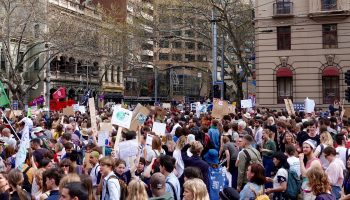by Leo Maletzke
Coffee is grown in 80 countries, is one of the world’s most popular drinks, and is the second most traded commodity after petroleum. A typical lifecycle of coffee has numerous stages and may involve the economies and geographies of multiple countries. First, the coffee tree grows from a planted seed in the ground. The tree grows over three years, growing fruit known as cherries. After another three years, these cherries can be harvested. The beans inside the cherries must then be picked. The bean is taste tested for quality, processed, by being dried out, and filtered. The beans are then hulled, which involves the removal of the dried shell of the bean. The beans are polished to improve appearance, cleaned, exported, and finally, roasted. In the process of brewing coffee, coffee grounds are spent, termed ‘spent coffee grounds’. These coffee grounds predominantly end up in landfill. This fate represents the misapplication of waste policy, particularly in Australia. One way to utilise spent coffee grounds is to turn them into an alternative energy source.
In an interview with Max Middleweek, founder of the renewable energy start-up Zero Impact, a new lifecycle for coffee grounds is illuminated. Zero Impact acquires spent coffee grounds from inner-city Melbourne cafes and processes them into coffee briquettes, which can be combusted and used to produce energy. Biofuels pose a meaningful alternative to fossil fuels. Biofuels are fuels that are produced from organic matter, or biomass, which includes plant material and organic matter such as coffee grounds. They are considered a renewable energy source and help to reduce carbon emissions that contribute to the warming of the atmosphere and our planet.
The discussion Max and I had in the interview is transcribed below.
Leo: What exactly is the environmental impact of coffee in Australia?
Max: I think our daily coffee habit has a greater impact than we think. 6 billion cups are drunk annually. There is a dark side to coffee consumption. Once you have your coffee from your barista, waste coffee grounds are generated. 9/10 coffees, including coffee grounds, end up in landfill. This is significant because landfill drives climate change, is a signifier of food wastage, and generates CO2 emissions. Our coffee habit is not necessarily a silent killer, but it is a harm we don’t think about because we don’t see it.
Leo: How can we reduce the impact of our coffee habit?
Max: In Australia, 220,000 tonnes of coffee waste are produced per year, which represents a large carbon footprint. This is not our biggest source – but it is large enough to care about. For consumers and individuals, one solution is to support a café that is actively recycling their coffee grounds.
Leo: How are waste coffee grounds used by Zero Impact?
Max: Zero Impact makes clean energy from coffee – we collect waste coffee grounds and create briquettes, an alternative to firewood that burns quicker and longer. This source of energy is much cleaner than coal. We sell products to people who have wood stoves and fire camps. We also work with pizzerias, plugging the gap in the market for businesses who want to be more sustainable. This helps to divert coffee grounds away from landfill.
Leo: In what ways have cafes and community businesses co-operated with Zero Impact?
Max: We still have a relatively small collection area. Our project is largely about education, working with cafes and their constraints. A busy café may produce 100kg of coffee grounds a day, and over one thousand dollars in costs a year to dispose of coffee grounds. Independent cafes are also under a lot of pressure especially due to competition with other cafes. Zero Impact offers a cost-effective pickup service. Cafes can save money by offloading waste coffee grounds and contribute to a circular economy.
Leo: Are you planning to expand into other areas?
Max: We currently work with the city of Melbourne and received a grant through them. We are aiming to expand our product and marketing. We want to collect coffee grounds from cafes in Melbourne, gaining a foothold and show that our product does work, and accelerate our reach.
Initiatives by companies and start-ups such as Zero Impact are important and have the potential to help transition Australia away from fossil fuels. Further, the stuttering of policy on a federal level demands such action. In consideration of the 2-degree target for global warming as outlined by the Paris Agreement of 2015, we need alternatives to fossil fuel, and fast. We are on track to experience a greater than 2 degree warming by 2100. It is our responsibility to ensure we minimise warming as much as possible. Zero Impact’s project has demonstrated how widening our frame of reference in regards to coffee grounds as an energy source is beneficial for cafes, the renewable energy sector, and in the reduction of greenhouse gas emissions.
This piece was published in print as part of Lot’s Wife Edition 4.


